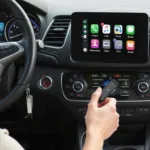Leaving your OBD2 scanner plugged in is a common question among car owners. This article delves into the potential benefits and drawbacks, helping you make an informed decision for your vehicle. We’ll explore the impact on battery life, security concerns, and compatibility issues, providing a comprehensive understanding of this often-debated topic. Learn about the various types of OBD2 scanners and their specific implications for continuous connection. Let’s get started.
Is it safe to leave your OBD2 scanner plugged into your car’s diagnostic port all the time? The answer isn’t a simple yes or no. It depends on several factors, including the type of scanner, your vehicle’s make and model, and your individual usage habits. For example, some Bluetooth OBD2 scanners are designed for continuous use, while others are better suited for occasional diagnostics. If you’re using a BAFX OBD2, you may have different considerations than someone using a different brand. See our article on leaving a BAFX OBD2 plugged in: bafx obd2 leave plugged in.
Understanding the OBD2 Port
The OBD2 port, typically located under the dashboard on the driver’s side, is a standardized interface for accessing your vehicle’s diagnostic data. It allows mechanics and car owners to retrieve trouble codes, monitor real-time sensor data, and perform various diagnostic tests. Understanding its function is crucial to assessing the implications of leaving an OBD2 scanner connected.
How OBD2 Scanners Work
OBD2 scanners communicate with your car’s computer, retrieving information about its various systems. This information can range from engine performance data to emissions readings and even security system status. Different scanners offer varying levels of functionality and data access, impacting their suitability for long-term connection. Some drivers find it convenient to keep an OBD2 adapter on their car the whole time for constant monitoring. You can read more about this practice in our article: obd2 adapter on car the whole time.
Battery Drain Concerns: Can Leaving OBD2 Plugged In Drain Your Battery?
One of the most common concerns about leaving an OBD2 scanner plugged in is the potential for battery drain. While some modern scanners have minimal power draw, older or poorly designed devices can draw enough current to drain your battery, especially if left connected for extended periods when the engine is off.
Minimizing Battery Drain
To minimize the risk of battery drain, consider unplugging the scanner when not in use, especially for overnight parking. Alternatively, choose a low-power Bluetooth scanner designed for continuous monitoring. Are Bluetooth OBD2 scanners safe to leave plugged in? Find out in our dedicated article: are bluetooth obd2 scanners safe to leave plugged in.
Security Implications: Is it Safe to Leave Your OBD2 Port Accessible?
Leaving your OBD2 port accessible with a scanner plugged in can potentially pose security risks, although the likelihood of this happening is relatively low. Theoretically, a malicious actor could access your vehicle’s systems through the OBD2 port, potentially manipulating data or even disabling certain functions.
Protecting Your Vehicle
To mitigate security risks, consider using a scanner with built-in security features or unplug the device when not in use. It’s also advisable to park in well-lit and secure areas to deter potential tampering.
 OBD2 Port Security
OBD2 Port Security
Compatibility and Vehicle Specifics
Compatibility between OBD2 scanners and specific vehicle makes and models can also influence the decision of whether to leave it plugged in. Some vehicles may experience issues with certain scanners, such as communication errors or even system malfunctions. Consult your vehicle’s owner’s manual or contact your manufacturer for specific compatibility information. Finding the OBD2 port in different car models can also be tricky. For instance, if you’re wondering “where is obd2 on 2008 odyssey?”, our article can help: whete is obd2 on 2008 odyssey.
Conclusion
The decision of whether to leave your OBD2 plugged in depends on various factors, including scanner type, vehicle compatibility, and security concerns. While continuous monitoring can be beneficial for real-time data access, potential battery drain and security risks should be considered. By weighing these factors, you can make an informed decision that best suits your needs. Sometimes, understanding the different types of connections can be helpful. For example, you might want to know more about micro USB to OBD2 connections: micro usb to obd2.
FAQ
- Can I leave my OBD2 scanner plugged in all the time? It’s generally not recommended due to potential battery drain and security concerns.
- Will leaving my OBD2 scanner plugged in damage my car? In most cases, no, but incompatibility issues can arise with certain vehicles and scanners.
- How can I minimize battery drain from my OBD2 scanner? Unplug the scanner when not in use or choose a low-power Bluetooth scanner.
- What are the security risks of leaving my OBD2 port accessible? While rare, there is a potential for unauthorized access to your vehicle’s systems.
- Where can I find information about OBD2 scanner compatibility with my car? Consult your owner’s manual or contact your vehicle manufacturer.
- What should I do if my car’s battery drains after leaving the OBD2 scanner plugged in? Disconnect the scanner and have your battery and charging system checked.
- Are there any benefits to leaving an OBD2 scanner plugged in continuously? Yes, it allows for real-time data monitoring and quick diagnostics.
Need help with your OBD2 scanner? Contact us via WhatsApp: +1(641)206-8880 or Email: [email protected]. We have a 24/7 customer support team ready to assist you.

